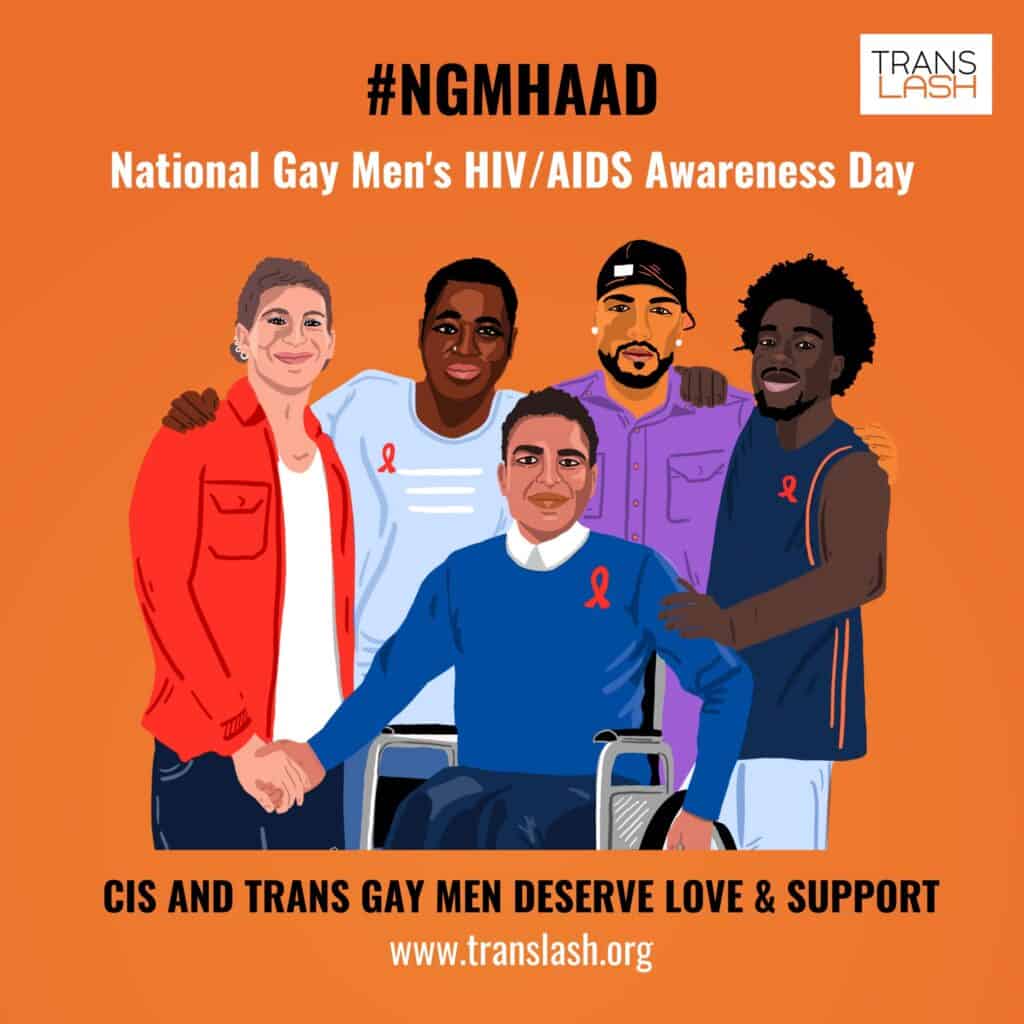
Learn more about trans-affirming HIV/AIDS resources for transgender men.
September 27 is National Gay Men’s HIV/AIDS Awareness Day, a day to help stop HIV stigma and encourage HIV testing, prevention, and treatment among gay and bisexual men. On #NGMHAAD we honor the lives of cis and trans men who deserve love and support.
By Daniela “Dani” Capistrano for TransLash Media
About National Gay Men’s HIV/AIDS Awareness
HIV/AIDS is an important health issue for people of all genders, including cis and trans men. The Centers for Disease Control and Prevent (CDC) reports that in 2020, gay and bisexual men (and men who have sex with men) accounted for 70 percent of new HIV infections in the U.S. It is estimated that 3% of transgender men in the United States have HIV.
As HRC explained, despite several years of research on HIV/AIDS and the populations it affects, we still know very little about transgender people and HIV.
Trans folks need to be included in all studies of HIV-affected communities and HIV/AIDS advocates and more LGBTQ+ communities need to acknowledge the ways in which trans people may be uniquely affected by HIV.
Knowing your status empowers you to take care of yourself. Whether you test positive or negative, there are resources to help keep you and your partners healthy. There are more HIV testing options than ever before; choose a test and choose to prioritize YOU! Click here for details!
The History Of National Gay Men’s HIV/AIDS Awareness Day
In 2008 the National Association of People with AIDS (NAPWA) launched this observance day to recognize the disproportionate impact of the epidemic on gay men. NAPWA is the oldest national AIDS organization, as well as the first network of people living with HIV/AIDS in the world.
Trans-Affirming HIV/AIDS Resources
The CDC has shared HIV/AIDS risk factors tied to transphobia and the marginalization that transgender people face, which contribute to high infection rates. These risk factors include higher rates of drug and alcohol abuse, sex work, incarceration, homelessness, attempted suicide, unemployment, lack of familial support, violence, stigma and discrimination, limited health care access, and negative health care encounters.
Trans men have always been a part of HIV/AIDS populations. The first known out gay trans man with AIDS in the United States was Lou Sullivan, who passed away from complications in 1991. Lou wrote “they told me at the gender clinic that I could not live as a gay man, but it looks like I will die as one.”
Trans men also deserve safe spaces to access HIV/AIDS resources that honor their gender and sexuality. Here are some ways for trans people to access HIV/AIDS information, resources, and community:
Transgender Law Center’s Positively Trans (T+) program: transgenderlawcenter.org
TLDEF’s Know Your Rights Guide: transequality.org
UCSF’s Center of Excellence for Transgender Health: prevention.ucsf.edu/transhealth
Southern AIDS Coalition: southernaidscoalition.org
While abusers may use HIV/AIDS as a tool of abuse against any partner, ongoing stigma against gay men living with HIV/AIDS can make it harder to access resources and support. Learn more here!
More TransLash HIV/AIDS Content
- TransLash Guide to National Black HIV/AIDS Awareness Day
- HIV Vaccine Awareness Day Resources
- Transcript: TransLash Podcast Episode 58, ‘Trans World AIDS Day‘
HIV/AIDS Resources For Gay And Bisexual Men
Learn more about how HIV affects gay and bisexual men by reading HIV and All Gay and Bisexual Men and HIV and African American Gay and Bisexual Men.
Visit the HIV.gov Basics section and CDC’s HIV basics page to learn about HIV prevention, testing, and living with HIV.
Use the HIV Testing Sites & Care Services Locator. The Locator now includes PrEP and STI services and is more user friendly. Read about how the new Locator can help you serve your community.
Visit https://gettested.cdc.gov/.
Read, share and subscribe to the HIV.gov blog.
The CDC’s Let’s Stop HIV Together campaign materials includes posters, graphics, videos and more.
HRSA’s Ryan White HIV/AIDS Program is dedicated to improving health outcomes.
ESCALATEExit Disclaimer (Ending Stigma through Collaboration and Lifting All To Empowerment) is an initiative that supports training designed to address HIV-related stigma, as well as additional efforts that provide resources and toolkits for engaging MSM at high risk in HIV care.
Sign up for the RWHAP listserv for HIV/AIDS news, updates, and education and training opportunities.
Join the National Hispanic Medical AssociationExit Disclaimer’s National Gay Men’s HIV Twitter chat on September 27, at 8:00 p.m.
Did you find this resource helpful? Consider supporting TransLash today with a tax-deductible donation.